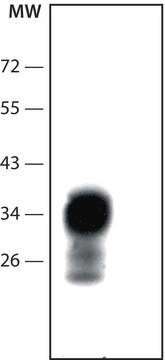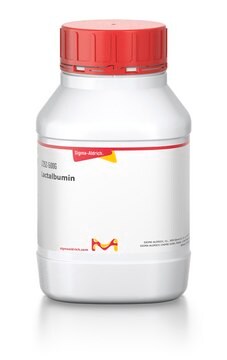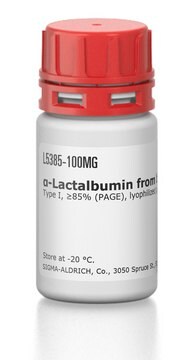AG210
Prion Protein, recombinant
Sinonimo/i:
PrP, CD230
Autenticatiper visualizzare i prezzi riservati alla tua organizzazione & contrattuali
About This Item
Codice UNSPSC:
12352203
eCl@ss:
32160702
NACRES:
NA.26
Prodotti consigliati
Origine biologica
bovine
Livello qualitativo
Saggio
>95% (total protein)
Forma fisica
liquid
Produttore/marchio commerciale
Chemicon®
tecniche
cell based assay: suitable
N° accesso UniProt
Condizioni di spedizione
dry ice
Informazioni sul gene
bovine (calf) ... PRNP(281427)
Descrizione generale
Histidine-tagged full-length mature part of bovine PrP (25-244) is expressed in E. Coli BL21, solubilized from inclusion bodies in 6 M guanidine-HCl, and purified by Ni(II)-nitriloacetate agarose chromatography followed by reversed-phase HPLC (C4 column)
Prion diseases or transmissible spongiform encephalopathies are neurodegenerative diseases that affect both humans and animals (Prusiner 1998). All prion diseases share the same molecular pathogenic mechanism that involves conversion of normal cellular prion protein (PrPc) into a form that is insoluble in non ionic detergent and partially resistant to proteases (PrPSc) (Pan et al. 1993). Both PrPSc and PrPc are encoded within a single exon of a chromosomal gene as a protein of ~ 250 amino acids (Basler et al. 1986). Many mammalian PrPs have a 22 amino acid N-terminal signal sequence (Hope et al. 1986; Turk et al. 1988) and 23 amino acid C-terminal signal sequence encoding for attachment of a glycosylphosphatidylinositol anchor (Stahl et al. 1987, 1990). The mature protein of 209 amino acids contains one disulfide bond (Turk et al. 1988) and has two sites of asparagine-linked glycosylation (Endo et al. 1989; Oesch et al. 1995).
Applicazioni
Antigen in standard immunochemical detection of BSE.
Optimal working dilution must be determined by the end user.
Optimal working dilution must be determined by the end user.
Research Category
Neuroscience
Neuroscience
Research Sub Category
Neurodegenerative Diseases
Neurodegenerative Diseases
Stato fisico
Liquid in 10 mM sodium acetate buffer, pH 4.0, containing 0.01% sodium azide.
Stoccaggio e stabilità
Maintain at -20°C in undiluted aliquots for up to 6 months after date of receipt. Avoid repeated freeze/thaw cycles.
Risultati analitici
The PrPc appears as a single band of about 27 kD by SDS-PAGE
Note legali
CHEMICON is a registered trademark of Merck KGaA, Darmstadt, Germany
Esclusione di responsabilità
Unless otherwise stated in our catalog or other company documentation accompanying the product(s), our products are intended for research use only and are not to be used for any other purpose, which includes but is not limited to, unauthorized commercial uses, in vitro diagnostic uses, ex vivo or in vivo therapeutic uses or any type of consumption or application to humans or animals.
Codice della classe di stoccaggio
12 - Non Combustible Liquids
Classe di pericolosità dell'acqua (WGK)
WGK 2
Punto d’infiammabilità (°F)
Not applicable
Punto d’infiammabilità (°C)
Not applicable
Certificati d'analisi (COA)
Cerca il Certificati d'analisi (COA) digitando il numero di lotto/batch corrispondente. I numeri di lotto o di batch sono stampati sull'etichetta dei prodotti dopo la parola ‘Lotto’ o ‘Batch’.
Possiedi già questo prodotto?
I documenti relativi ai prodotti acquistati recentemente sono disponibili nell’Archivio dei documenti.
Purification and properties of the cellular and scrapie hamster prion proteins.
Turk, E, et al.
European Journal of Biochemistry, 176, 21-30 (1988)
Scrapie and cellular PrP isoforms are encoded by the same chromosomal gene.
Basler, K, et al.
Cell, 46, 417-428 (1986)
Prions.
Prusiner, S B
Proceedings of the National Academy of Sciences of the USA, 95, 13363-13383 (1998)
Identification of glycoinositol phospholipid linked and truncated forms of the scrapie prion protein.
Stahl, N, et al.
Biochemistry, 29, 8879-8884 (1990)
Scrapie prion protein contains a phosphatidylinositol glycolipid.
Stahl, N, et al.
Cell, 51, 229-240 (1987)
Il team dei nostri ricercatori vanta grande esperienza in tutte le aree della ricerca quali Life Science, scienza dei materiali, sintesi chimica, cromatografia, discipline analitiche, ecc..
Contatta l'Assistenza Tecnica.








